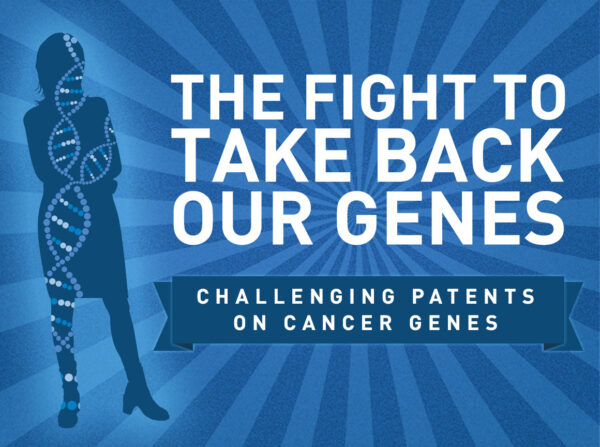Supreme Court to Hear Case Challenging Patents on Breast and Ovarian Cancer Genes
ACLU and PUBPAT Filed on Behalf of Medical Associations, Geneticists, Patients and Breast Cancer and Women’s Health Groups
FOR IMMEDIATE RELEASE
CONTACT: (212) 549-2666; media@aclu.org
WASHINGTON – The U.S. Supreme Court announced today that it will hear arguments in a case seeking to invalidate patents for two genes associated with hereditary breast and ovarian cancer.
The original lawsuit was filed by the American Civil Liberties Union and the Public Patent Foundation (PUBPAT) on behalf of researchers, genetic counselors, patients, breast cancer and women's health groups, and medical professional associations representing 150,000 geneticists, pathologists and laboratory professionals. The patents allow a Utah company to control access to crucial genetic information used to make important medical decisions.
The lawsuit charges that the challenged patents are unlawful because genes are “products of nature” and restrict both scientific research and patients’ access to medical care.
A federal district court invalidated the challenged patents in 2010. In August, a divided federal appeals court ruled for the second time that companies can obtain patents on the genes. Its 2-1 ruling came after a Supreme Court order directing the court to reconsider its initial ruling following a related Supreme Court decision last spring addressing the patentability of medical diagnostics.
Lisbeth Ceriani, a breast cancer survivor and plaintiff in the case, was faced with having to pay over $4,000 for Myriad’s testing to determine if she carried a genetic mutation associated with hereditary ovarian cancer because Myriad had refused to enter into a contract with her insurance company. She was forced to wait 18 months before she was able to obtain the test through a grant, at which point she learned she did indeed carry a mutation.
“Women should not have to go through what I went through in order to take care of themselves and continue to take care of their families,” said Ceriani. “My genes belong to me. Knowledge about my own body should not be held hostage by a corporation.”
The patents granted to Myriad Genetics and the University of Utah Research Foundation give the company an exclusive right to the BRCA1 and BRCA2 genes and the ability to control the diagnostic care provided to hereditary breast and ovarian cancer patients and people at high risk for these diseases.
“It’s wrong to think that something as naturally occurring as DNA can be patented by a single company that limits scientific research and the free exchange of ideas,” said Chris Hansen, staff attorney with the ACLU Speech, Privacy and Technology Project. “The Court of Appeals failed to consider the Supreme Court’s most recent ruling on patent law.”
Myriad's monopoly on the BRCA genes allows it to set the terms and cost of testing and makes it impossible for women to access alternate tests or get a comprehensive second opinion about their results. It also allows Myriad to prevent researchers from even looking at the genes without first getting permission from Myriad.
“Myriad did not invent human genes, and has no right to claim ownership of them just because they removed them from the body,” said Daniel B. Ravicher, executive director of PUBPAT. “The government does not have the right to give a corporation the exclusive power to control what we know about our own genetic makeup.”
Kathleen Maxian of Buffalo, N.Y. is suffering from late-stage ovarian cancer that she believes could have been prevented. Her sister, who is a breast cancer survivor, obtained a test from Myriad that did not look for all known genetic mutations associated with cancer and was told she was negative for mutations. Years later her sister learned that she did, in fact, have a BRCA genetic mutation -- information that Maxian could have relied on to seek preventive surgery. Numerous labs across the country have stated that they are capable of providing this comprehensive screening and would do so were it not for the patents.
“These patents endanger women who deserve access to the best possible care as they make life-changing medical decisions,” said Sandra Park, staff attorney with the ACLU Women’s Rights Project. “One company should not be able to dictate what testing is available and what research is pursued on two genes connected to devastating cancers.”
For more information on this case, please visit www.aclu.org/brca


